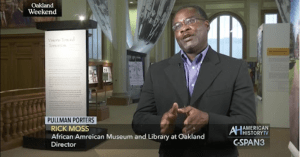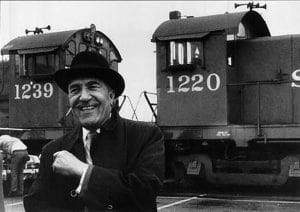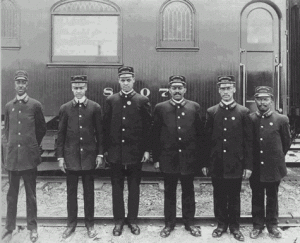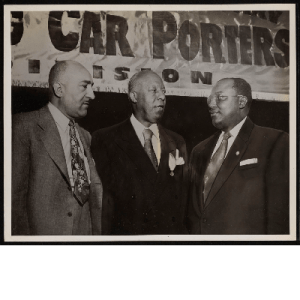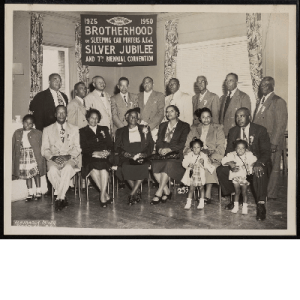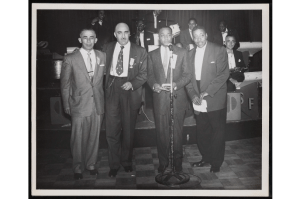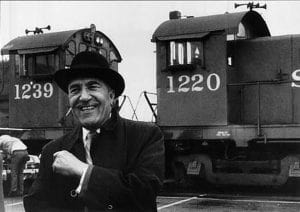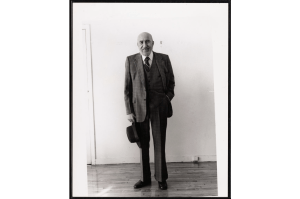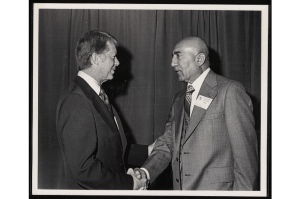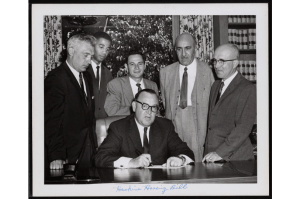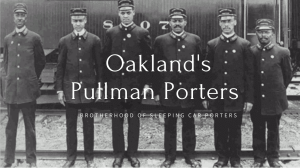
During the 19th century, one of the biggest corporations in America was the Pullman Company. George Pullman developed the idea of having a luxury train service where passengers could get to and from their destinations in less cramped, uncomfortable conditions. Pullman’s idea was to use the services of African Americans to serve as servants on the trains. He believed that African Americans would work as servants because they were used to working for free. African Americans also had the experience of being slaves and therefore, knew the “societal distinction” between black and white. Knowing this distinction would make it easier for porters to serve in a servant role.
Pullman porters were respected in the African American community. Outside of the African American community, respect was hard to come by. All porters were called “George” as they were considered to be George Pullmans' boys. The porters had no rights and could be fired without cause.
History of the Pullman Porters and their Union
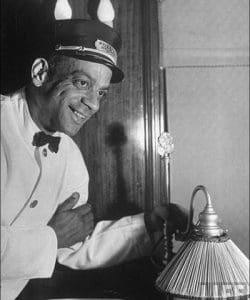
History Of The Pullman Porters
The Pullman Porters, opens a new window were overworked, underpaid, and demeaned, but generations of porters on the Pullman Palace Car Company helped promote the rights and futures of African Americans.
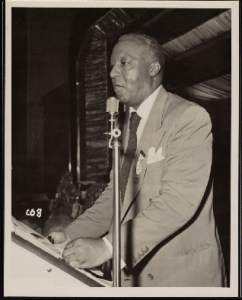
A. Philip Randolph
A. Philip Randolph, opens a new window founded the first Black workers’ union, the Brotherhood of Sleeping Car Porters. Because of his ability to organizing the Brotherhood of Sleeping Car Porters he was referred to as "the most dangerous Negro in America"
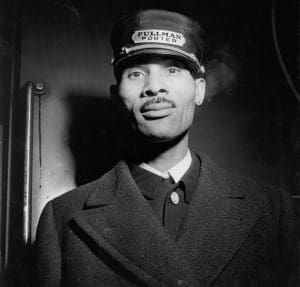
Brotherhood Of Sleeping Car Porters
Brotherhood of Sleeping Car Porters, opens a new window were the first African American labor union to be affiliated with the American Federation of Labor.
Journal Articles and Databases
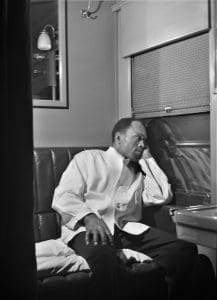 GALE IN CONTEXT: U.S. History
GALE IN CONTEXT: U.S. History
The Pullman Porters Brotherhood of Sleeping Car Porters
Alexander Street: Black Thought and Culture
Pullman Porters Win Discrimination Suit
Open JSTOR Collection
PART III THE BROTHERHOOD OF SLEEPING CAR PORTERS AND OTHER BLACK UNIONS IN THE TRAIN SERVICE
Open JSTOR Collection
Pullman Porter Not Railway Employee
By 1920 the Pullman Company was one of the largest employers of African Americans. These positions were considered the “best jobs” for African Americans. Upon receiving word from friends and families, other African American families migrated to California to take jobs as Pullman Porters as well. These African American men came in hopes of a better life and opportunities for their families. The average pay during the 1920s was just $15 a week. To make ends meet many porters found themselves working 60 hours or more a week. The porters supplemented their earnings with the tips they earned while on duty.
Oakland, CA
AAMLO Collection on CSPAN
Rick Moss showed some of the items from the Pullman porters collection, opens a new window at the African American Museum and Library at Oakland. Pullman porters, many of whom were African American, were men hired to work on railroad sleeping cars. These jobs with the railroads afforded many African Americans a way out of the segregated South and brought many to cities in the northern and western U.S., such as Oakland, California.

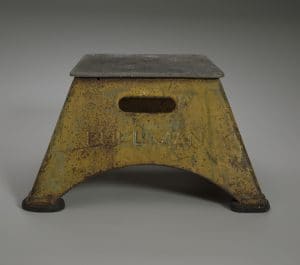
Pullman Cap Pullman Pin Platform Step Stool
Previous efforts to organize a union were unsuccessful because of the threats from the Pullman Company. Anyone who attempted to join this union would be fired. Pullman made good on this promise firing anyone who joined this union. The Porters waged a 12 years fight for better wages and working conditions. It culminated with the Pullman Porters becoming the first African American group to be recognized by a major corporation as a union.
The Journey West
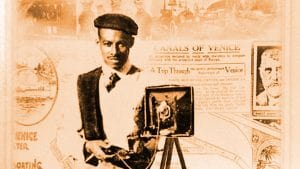 The Transcontinental Railroad, African Americans and the California Dream By Alison Rose Jefferson
The Transcontinental Railroad, African Americans and the California Dream By Alison Rose Jefferson
Before, during and after the transcontinental railroad’s construction thousands of enslaved and then freedmen worked on the railroads grading lines, building bridges, and blasting tunnels. They working as firemen shoveling coal into the boiler riding alongside the engineer, and as brakemen and yard switchmen. They loaded baggage and freight, and sometimes drove the train. The post-Civil War years into the early decades of the twentieth century, black men gained employment on the transcontinental railroad, most often as Pullman Company’s Palace Car porters and waiters, helping to define American travel and becoming a symbol of upward mobility for black males during the nation’s railroad transportation era.
NPR Recordings
This week marks the 60th anniversary of the first labor contract ever signed by an African American union. The Pullman Porters and the George Pullman Company reached an agreement that made conditions for the porters working on the first-class Pullman car more humane. We have this recollection by Happy Davis, a long time Pullman porter, about what life was like working on the luxurious Pullman cars. This is an excerpt from a collection of radio stories by producer Dave Isay called "Holding On".
Pullman Porter Blues' Travels Back In Time
Playwright Cheryl West brings their story back to life in a new play, Pullman Porter Blues, running at Washington, D.C.'s Arena Stage through Jan. 6. West was inspired by her grandfather, who worked on postal trains, and a trip she took as a young child. She remembers the porters' smiles and their impeccably pressed white jackets.
Saluting A. Philip Randolph, Workers' Champion
Asa Philip Randolph started his career as an actor in Harlem. But he soon noticed unfair work conditions for blacks and saw the need to organize workers in various industries. By the mid 1920s he had organized the Brotherhood of Sleeping Car Porters, a large union representing black railroad workers.
Pullman Porters Helped Build Black Middle Class
Tye, who wrote Rising from the Rails: The Pullman Porters and the Making of the Black Middle Class, says Pullman knew they would come cheap, and he paid them next to nothing. And he knew that there was never a question off the train that you would be embarrassed by running into one of these Pullman porters and having them remember something you did that you didn't want your wife or husband, perhaps, to remember during that long trip.
C.L. Dellums
Mr. C. Laurence Dellums can look back upon a half century of activity in the field of Human Relations, particularly fighting racial and religious discrimination. He was born in Corsicana, Texas on January 3, 1900, and he attended the public schools in Texas, graduating from Jackson High School in 1919. He chose to make his permanent home in the bay district, and has been a resident of Oakland since 1923. He joined the Brotherhood of Sleeping Car Porters when it was organized in 1925, becoming a local official when the local was established in 1926, becoming a full-time official in 1927, and when the "International" was set up in 1929, he was elected a Vice President, a position he held until October, 1968. Effective that date, Mr. A. Philip Randolph, founder, organizer and first International President, retired, and upon his nomination, Mr. Dellums was elected his successor.
Mr. Dellums was the first Negro elected member of the Executive and Arbitration Committee for the Central Labor Council of Alameda County. He joined the N.A.A.C.P. in 1924, and has been actively involved since 1927. He served many years in the Alameda County Branch, N.A.A.C.P.; when he was elected President of the same branch the membership was under 400, and when he left the presidency it was 3500. When the eight western states were formed into an N.A.A.C.P. Region in 1944, he was the unanimous choice for the Chairmanship and remained in that position without opposition until he refused to serve any longer and was replaced in 1967. Mr. Dellums holds too many "firsts" to enumerate, and it would take too much space to list all of them."
Mr. Dellums and Mr. Randolph became closer than no doubt any other officials in the organization because of their similar philosophies. At every opportunity they spent much time together discussing the plight of the Negro and planning something to do about it, including the original March on Washington movement, which resulted in President F. D. Roosevelt issuing Executive Order No. 8802 in 1941, eliminating discrimination in defense industries and the government itself.
He helped organize and led the statewide movement for a state fair employment practices law. After its adoption, Governor Brown asked him to accept an appointment to the Commission. Mr. Dellums accepted a two-year term in 1959, a full term in 1961, and a second full term in 1965, at which time the Governor appointed him Chairman of the Commission, which is another Negro "first." He was succeeded as Chairman of the Commission by Commissioner Gherini. Of the seven Commissioners, Mr. Dellums was the only one that Governor Reagan reappointed.
From the office of the Brotherhood of Sleeping Car Porters ca. 1972" Joyce A. Henderson
Earl Warren Oral History Project
C. L. Dellums
International President of the Brotherhood of Sleeping Car Porters and Civil Rights Leader
With an Introduction by Tarea Hall Pittman
An Interview Conducted by Joyce Henderson
The Bancroft Library
University of California, Berkeley
About C.L. Dellums
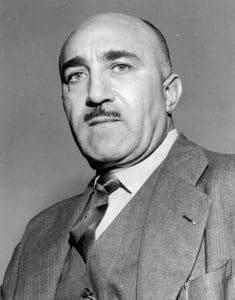 Interviews and Articles
Interviews and Articles
Internet Archive: Interview with C.L. (Cottrell Laurence) Dellums
Interview with union and civil rights leader C.L. (Cottrell Laurence) Dellums discussing his work with A. Philip Randolph, Brotherhood of Sleeping Car Porters, Executive Order 8802 and the March on Washington.
California Labor Federation: Honoring Labor and Civil Rights: Activist C.L. Dellums
Cottrell Laurence Dellums, also known as C.L. Dellums, was a prominent African American trade union activist, and uncle and role model to Congressman Ron Dellums.
Romancing the Rails - Part IV Sleeping Car Porters
This segment of the 1 hour, prime time special that first aired September 25, 1988 on WUSA, Romancing the Rails, focuses on the Sleeping Car Porters who played a major role in the Civil Rights movement. Featured is what may have been the last television interview of C.L. Dellums
California Historical Society: African Americans, the "Iron Road", and Manifest Destiny
In observance of the sesquicentennial of the completion of the Transcontinental Railroad, Dorothy Lazard, head librarian of the Oakland History Room, examines the largely unheralded role of African Americans in the creation and advancement of the railroad.
The Bancroft Library University of California, Berkeley: International President of the Brotherhood of Sleeping Car Porters and Civil Rights Leader An Interview by Joyce Henderson.
From the Archive
The C.L. Dellums Papers provide insight into Dellums' career as a civil rights activist and labor leader. They encompass files he maintained as both the International Vice-President of the Brotherhood of Sleeping Car Porters and as a member of the Fair Employment Practices Commission. In addition, they include some biographical materials and associated artifacts.
Historic Sites and Activities in Oakland
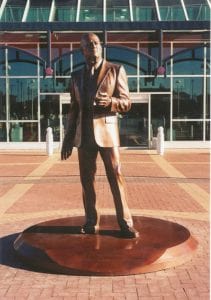 The Historical Marker Database: Oakland Rails
The Historical Marker Database: Oakland Rails
Sleeping Car Porters
Among the most respected members of Oakland’s African American community were the Pullman Porters, uniformed attendants who staffed the railroad’s luxurious Pullman Sleeping Cars. The Porters provided professional and courteous service on the overland routes.
National Park Service: Brotherhood of Sleeping Car Porters Headquarters Site
C. L. Dellums Amtrak Station
Amtrak Station; Oakand Jack London: C.L. Dellums Memorial Sculpture
The Bancroft Library University of California, Berkeley: C.L. Dellums Amtrak Station Pavillion
OurOakland.Net Walking Tour: C.L. Dellums
Black Liberation Walking Tour: C.L. Dellums, opens a new window
Activities
THEATRIUS Oakland Theater Project’s ‘Binding Ties’
The Oakland Theater Project: BINDING TIES: THE 16TH STREET STATION
Books and Media
The Pullman Porters and West Oakland
Railroad Men And Race Leadership In Oakland
The Pullman Porters and West Oakland
Pullman Porters and the Rise of Protest Politics in Black America, 1925-1945

